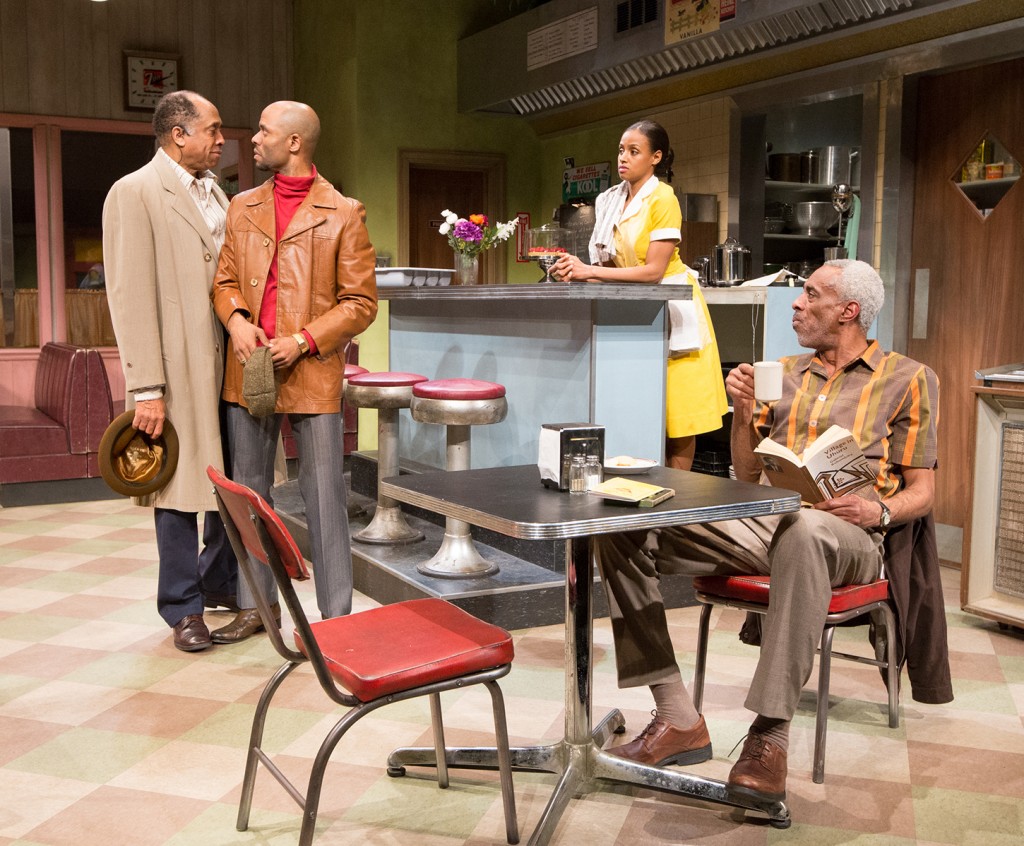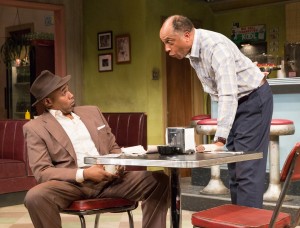
Photo by Mark Garvin.
August Wilson is a really good playwright. That’s hardly a bold critical statement, but it’s one confirmed by a vivid production of his TWO TRAINS RUNNING now onstage at Arden Theatre Company.
TWO TRAINS RUNNING marks the 1960s entry into Wilson’s decade-by-decade theatrical consideration of the African American experience in the 20th century. The action takes place in 1969, within the confines of a past-its-prime diner in a decaying neighborhood of Pittsburgh. Owner Memphis Lee (given a fully realized natural range by Johnnie Hobbs Jr.) feels the helplessness that pervades the economically challenged area: “Ain’t nothing gonna be left around here. Supermarkets gone. Two drug stores. The five and ten. Doctor done moved out. Shoe store gone.” The only business still booming is the funeral parlor across the street, because killing “don’t never go out of style.”
The regulars at Lee’s Diner adapt to the circumstances in varied ways. Funeral director West (E. Roger Mitchell) profits from the deaths. Fresh from prison, Sterling (U.R., in a vibrant performance) embarks on a fruitless search for a job—you need to be in a union to get work at the steel mill; you need to be working at the steel mill to join the union. He doubts law-abiding labor will ever prove fulfilling.
Sterling is enticed by the promises of civil rights protest—the historical fractures and struggles of the 1960s ring TWO TRAINS RUNNING without strangling it. Old-timer Holloway (energized by Damien J. Wallace) dismisses these promises. He’s resigned to a status quo of institutionalized racism. He wonders if the one among them with the “most sense” is the raving Hambone (given an unlikely gravitas by Kash Goins).
A decade ago, Hambone was deprived by a white Lutz of his rightful payment for painting a fence. Driven to insanity by the incident—“I want my ham… he gonna give me my ham,” he repeats—Hambone is alone in the diner in his refusal to accept injustice. Now Memphis faces a similarly maddening maltreatment: city authorities want to buy his building for a fraction of market value for some unspecified project.

Memphis’s reaction to his maltreatment provides the core of the play. Wilson weaves a cleverly plotted narrative through lively naturalistic dialog (subtly amplified at times by sound designer Mikaal Sulaiman), eschewing easy plot turns or didactic politicization. Director Raelle Myrick-Hodges makes more overt attempts to frame TWO TRAINS RUNNING within a the historical-political experience of racial oppression—archive tapes from James Baldwin, Malcolm X, and others provide context between scenes; historical photos are projected above David P. Gordon’s faithful diner set.
Yet Wilson’s skill—which Myrick-Hodges recognizes and accentuates—comes in creating recognizable individuals: real characters who represent the experiences of many without devolving into caricature. This is perhaps most true with the sole female in the diner, waitress Risa (Lakisha May). Risa stands at an intersection of oppressions: men who rail against the inequality of the races have no qualms objectifying her body and disregarding her presence.
May imbues her Risa with a quiet nobility. A beautiful woman, Risa has disfigured her legs in rebellion against the lechery of men. May and her costars never find the romantic chemistry in Wilson’s script, but this feels intentional: Risa is not choosing a mate for love.
Risa is not the only strong female character in TWO TRAINS RUNNING; she’s just the only one onstage. The supernatural promises of Aunt Ester (who manifests in Wilson’s Gem of the Ocean and is also a presence in King Hedley II and Radio Golf) give touches of magic to a work of realism.
But Wilson’s true magic comes in his ability to mold conventional (traditionally white?) drama to his lofty aims, showing piercing insight into characters and relationships over a century of black life. Rather than forge his own theatrical path, like his African American influences (LeRoi Jones/Amiri Baraka) or contemporaries (Suzan-Lori Parks), Wilson worked within the confines of realistic theater. In doing so, he gave us some of that genre’s finest plays.
[Arden Theatre Company, 40 N. Second Street] March 10-April 10, 2016; ardentheatre.org.

Excellent review of Two Trains Running, August Wilson’s glimpse into the life of one community during the Civil Rights Movement. I see every Wilson play I get the chance to, and am thrilled that Arden has brought Two Trains Running to Philadelphia.
Thanks Pat, you should see this one.